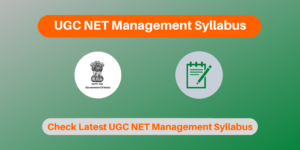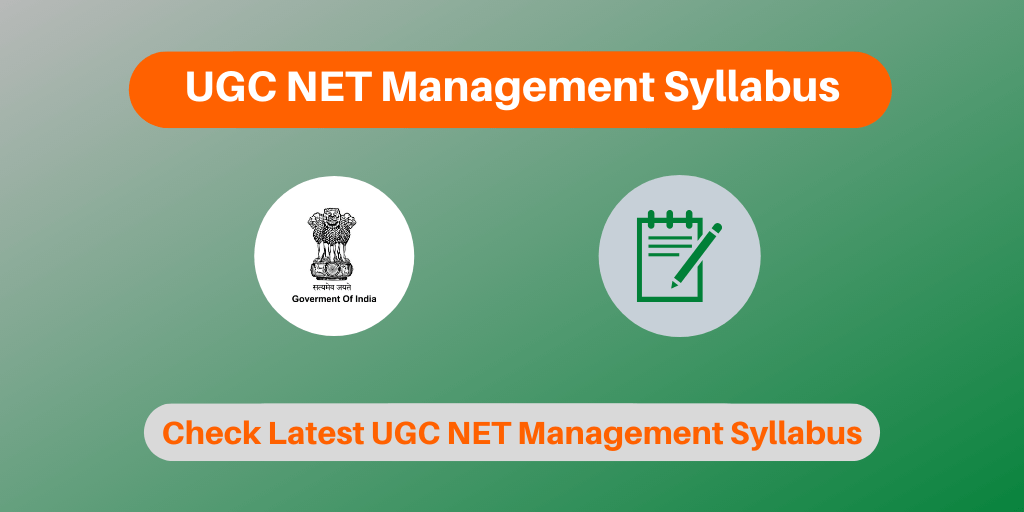
UGC NET Management Syllabus 2021: The UGC NET Management exam has two papers – Paper-I and Paper-II. In Paper-I your reasoning ability, comprehension, divergent thinking, and general awareness will be tested. In Paper-II, the question will be based on Management. All the questions of Paper-II will be compulsory. Therefore, it is very important to have UGC NET Management Syllabus with you.
Here we have provided the latest UGC NET Management Syllabus in English and Hindi. You can check easily check the Management syllabus and also able to download the PDF.
UGC NET Management Syllabus 2021 PDF
In June 2019, the University Grants Commission (UGC) NET Bureau revised the syllabus for the UGC NET in Management, and the same syllabus will be used for the upcoming UGC NET / JRF, SET, or SLET exams. The detailed syllabus for Management Paper-1 can be found from the below link:
Let’s take a look at the Chapter-Wise Paper 2 UGC NET Syllabus for Management:
UGC NET Management Syllabus In English
Here you can check the latest UGC NET Management Syllabus 2021 in English.
Subject: Management
Code No.: 88
Unit–I: Management
- Management: Concept, Process, Theories and Approaches, Management Roles
- and Skills
- Functions: Planning, Organizing, Staffing, Coordinating, and Controlling.
- Communication: Types, Process, and Barriers.
- Decision Making: Concept, Process, Techniques, and Tools
- Organization Structure and Design: Centralisation, Decentralisation, and Span of Control, Types, Authority, Responsibility
- Managerial Economics: Concept & Importance
- Demand analysis Utility Analysis, Indifference Curve, Elasticity & Forecasting
- Market Structures: Market Classification & Price Determination
- National Income: Concept, Types, and Measurement
- Inflation: Concept, Types and Measurement, Business Ethics & CSR, Ethical Issues & Dilemma, Corporate Governance, Value-Based Organisation
Unit–II: Organizational Behaviour
- Organizational Behaviour: Its Significance & Theories
- Individual Behaviour: Personality, Attitude, Perception, Values, Learning and
- Motivation
- Group Behaviour: Team Building, Leadership, Interpersonal Behaviour & Transactional Analysis, Group Dynamics, Organizational Culture & Climate, Workforce Diversity & Cross Culture Organisational Behaviour, Organisational Justice and Whistle Blowing, Emotions and Stress Management
- Human Resource Management: Concept, Perspectives, Influences and
- Recent Trends, Human Resource Planning, Recruitment, and Selection, Induction, Training
and Development, Job Analysis, Job Evaluation, and Compensation Management
Unit–III: Competency Mapping
- Competency Mapping & Balanced Scoreboard
- Career Planning and Development
- Strategic Role of Human Resource Management
- Performance Management and Appraisal
- Talent Management & Skill Development
- Employee Engagement & Work-Life Balance
- Organization Development, Change & OD Interventions
- Industrial Relations: Disputes & Grievance Management, Labour Welfare and
- Social Security
- Trade Union & Collective Bargaining
- International Human Resource Management: HR Challenge of International, Business, Green HRM
Unit– IV: Accounting Principles and Standards
- Accounting Principles and Standards, Preparation of Financial Statements
- Financial Statement Analysis, Ratio Analysis, Funds Flow, and Cash Flow
- Analysis, DuPont Analysis, Preparation of Cost Sheet, Marginal Costing, Cost Volume Profit Analysis, Standard Costing & Variance Analysis, Financial Management, Concept & Functions
- Capital Structure: Theories, Cost of Capital, Sources, and Finance; Budgeting and Budgetary Control, Types and Process, Zero base Budgeting
- Leverages: Operating, Financial and Combined Leverages, EBIT–EPS, Analysis, Financial Breakeven Point & Indifference Level.
Unit–V: Value & Returns
- Value & Returns: Time Preference for Money, Valuation of Bonds and Shares,
- Risk and Returns; Capital Budgeting: Nature of Investment, Evaluation, Comparison of Methods;
- Risk and Uncertainty Analysis
- Dividend: Theories and Determination
- Mergers and Acquisition: Corporate Restructuring, Value Creation, Merger
- Negotiations, Leveraged Buyouts, Takeover
- Portfolio Management: CAPM, APT
- Derivatives: Options, Option Payoffs, Option Pricing, Forward Contracts &
- Future Contracts
- Working Capital Management: Determinants, Cash, Inventory, Receivables and
- Payables Management, Factoring
- International Financial Management, Foreign exchange market
Unit–VI: Strategic Management
- Strategic Management: Its Concept, Process, Decision & Types
- Strategic Analysis: External Analysis, PEST, Porter’s Approach to industry
- analysis, Internal Analysis: Resource-Based Approach, Value Chain Analysis
- Strategy Formulation: SWOT Analysis, Corporate Strategy – Growth, Stability,
- Retrenchment, Integration and Diversification, Business Portfolio Analysis – BCG,
- GE Business Model, Ansoff’s Product-Market Growth Matrix
- Strategy Implementation: Challenges of Change, Developing Programs
- Mckinsey 7s Framework
- Marketing: Concept, Orientation, Trends and Tasks, Customer Value and
- Satisfaction
- Market Segmentation, Positioning, and Targeting
- Product and Pricing Decision: Product Mix, Product Life Cycle, New Product
- development, Pricing: Types and Strategies
- Place and promotion decision: Marketing channels and value networks, VMS,
- IMC, Advertising and Sales promotion
Unit–VII: Consumer and Industrial Buying Behaviour
- Theories and Models of Consumer
- Behavior
- Service Marketing: Managing Service Quality and Brands, Marketing Strategies
- of Service Firms Customer Relationship Marketing: Relationship Building, Strategies, Values and Process
- Brand Management: Role of Brands, Brand Equity, Equity Models, Developing
- a Branding Strategy; Brand Name Decisions, Brand Extensions, and Loyalty
- Logistics and Supply Chain Management, Drivers, Value creation, Supply Chain
- Design, Designing and Managing SalesForce, Personal Selling
- Retail Marketing: Recent Trends in India, Types of Retail Outlets.
- Emerging Trends in Marketing: Concept of e-Marketing, Direct Marketing,
- Digital Marketing and Green Marketing
- International Marketing: Entry Mode Decisions, Planning Marketing Mix for
- International Markets
Unit–VIII – Statistics for Management
- Statistics for Management: Concept, Measures Of Central Tendency and
- Dispersion, Probability Distribution: Binominal, Poison, Normal and Exponential, Data Collection & Questionnaire Design
- Sampling: Concept, Process, and Techniques
- Hypothesis Testing: Procedure; T, Z, F, Chi-square tests
- Correlation and Regression Analysis
- Operations Management: Role and Scope
- Operation Research: Transportation, Queuing Decision Theory, PERT / CPM
- Facility Location and Layout: Site Selection and Analysis, Layout – Design and
- Process
- Enterprise Resource Planning: ERP Modules, ERP implementation; Scheduling; Loading, Sequencing, and Monitoring; Quality Management and Statistical Quality Control, Quality Circles, Total Quality
- Management: KAIZEN, Benchmarking, Six Sigma; ISO 9000 Series Standards
Unit–IX: International Business
- International Business: Managing Business in Globalization Era; Theories of International Trade; Balance of payment
- Foreign Direct Investment: Benefits and Costs; Multilateral regulation of Trade and Investment under WTO; International Trade Procedures and Documentation; EXIM Policies
- Data Warehousing, Data Mining, and Knowledge Management: Concepts
- Managing Technological Change
- Role of International Financial Institutions: IMF and World Bank
- Information Technology: Use of Computers in Management Applications; MIS,
- DSS, Artificial Intelligence, and Big Data
Unit–X: Entrepreneurship Development
- Entrepreneurship Development: Its Concept, Types, Theories, and Process, Developing Entrepreneurial Competencies
- Innovations in Business: Types of Innovations, Creating and Identifying, Women Entrepreneurship and Rural Entrepreneurship
- Intrapreneurship: Concept and Process, Opportunities, Screening of Business Ideas
- Business Plan and Feasibility Analysis: Concept and Process of Technical,
- Market and Financial Analysis; Micro and Small Scale Industries in India; Role of Government in Promoting SSI
- Sickness in Small Industries: Reasons and Rehabilitation
- Institutional Finance to Small Industries: Financial Institutions, Commercial
- Banks, Cooperative Banks, Micro Finance
Download UGC NET Management Syllabus PDF In English
UGC NET Management Syllabus 2021 In Hindi
Here you can check the latest UGC NET Syllabus For Management in Hindi:
Download UGC NET Management Syllabus 2021 In Hindi
Other Important UGC NET Paper 2 Syllabus
Click on the link to access other important syllabus related to the UGC NET Paper 2 exam:
Must-Read: UGC NET Management Exam Pattern
UGC NET Management Exam has two papers i.e. Paper 1 and Paper 2. Both the papers will consist of objective type, multiple-choice questions. There will be no break between papers.
Here you can take a look at the major highlights of both the papers of the UGC NET Management 2020 December exam.
|
Particulars |
UGC NET Management Paper-I Overview |
UGC NET Management Paper-II Overview |
|---|---|---|
|
Exam mode |
Online |
Online |
|
Exam duration |
3 hours (180 minutes) |
|
|
Type of paper |
Common for all candidates |
Subject-specific questions |
|
Total questions |
50 |
100 |
|
Type of questions |
MCQs; 4 options with only 1 correct option |
MCQs; 4 options with only 1 correct option |
|
Total marks |
100 |
200 |
|
Marking scheme |
+2 for a correct answer 0 for incorrect answer |
+2 for a correct answer 0 for incorrect answer |
|
Language of paper |
English and Hindi |
English and Hindi |
Other Key points about UGC NET Management Exam Pattern:
- For each correct response, the candidate will get 2 marks.
- There is no negative marking for an incorrect response.
- No marks will be given for questions Unanswered/ Marked for Review.
Read More for UGC NET Environmental Science Syllabus
You can have a detailed information for Environmental Chemistry, Environmental Biology, geo sciences, and environmental pollution: air pollution, water pollution, noise pollution, soil pollution, and many other topics.
Other Important Links
Must Read
- UGC NET Syllabus
- UGC NET Subjects
- UGC NET Books
- UGC NET Date Sheet
- UGC NET Admit Card
- UGC NET Exam Centre
- UGC NET Exam Analysis
- UGC NET Answer Key
- UGC NET Result
- UGC NET Cut Off
- UGC NET Certificate
- UGC NET Career Scopes
We have covered the detailed guide on UGC NET Management Syllabus 2021. Feel free to ask us any questions in the comment section below.
FAQs- UGC NET Management Syllabus
Is UGC NET Syllabus for Management tough?
Yes. Every year lakhs of students appear for this examination to become Assistant Professor or JRF. It makes the NTA NET Management syllabus to be tough.
What are the major topics in UGC NET Management 2021 Syllabus?
The major topics of UGC NET Management Syllabus 2021 are: MANAGEMENT, ORGANISATIONAL BEHAVIOUR, HUMAN RESOURCE MANAGEMENT, and STRATEGIC MANAGEMENT.
Where can I check the complete UGC NET Syllabus for Management?
You can check the complete UGC NET Management Syllabus from the above blog.
Do we need to study Competency Mapping for NTA NET Management Paper 2 Exam?
Yes. As per the latest UGC NET Management Syllabus, you have to study Competency Mapping for Management Paper 2 Exam.
What type of questions are asked in UGC NET Management Paper 2?
UGC NET Paper 2 will cover objective type multiple-choice, matching-type, assertion-reason, statement conclusion questions related to Management subject.
Where can I Download UGC NET Management Syllabus In Hindi?
You can download the NTA NET Management Syllabus in Hindi from the above blog.
How can I prepare for UGC NET management?
Here are Some Preparation Tips for UGC NTA NET Management in 3 Simple Steps –
Step 1: Make Time Table for Preparation 7 Go through the UGC NET Management Syllabus.
Step 2: Solve Previous Year Papers & Refer Other Materials.
Step 3: Revision
